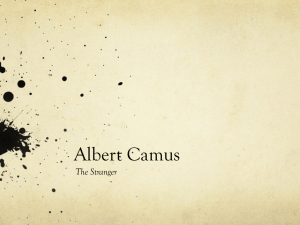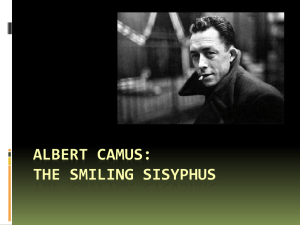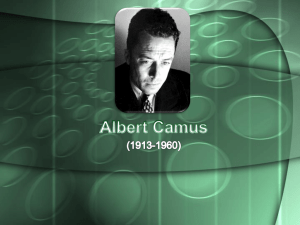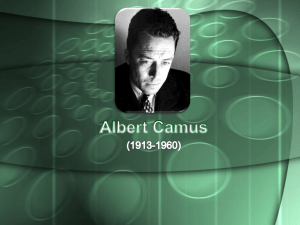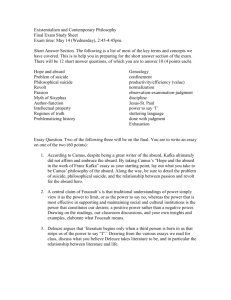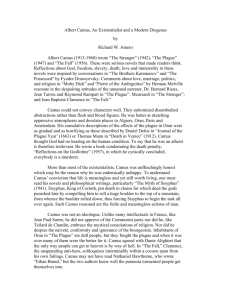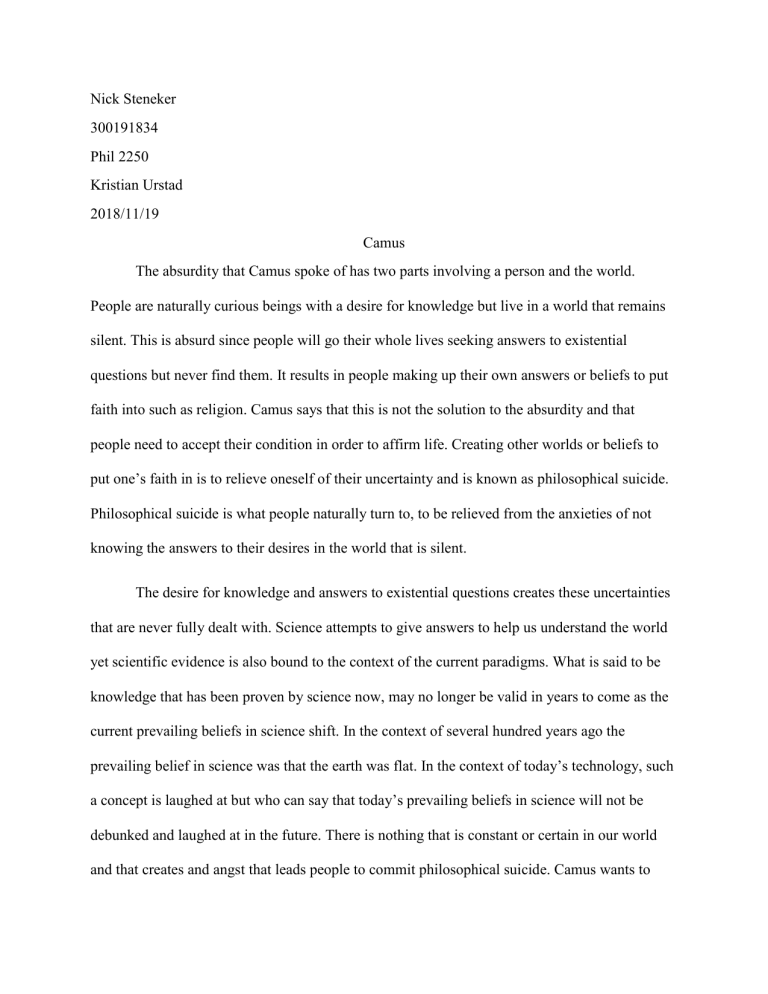
Nick Steneker 300191834 Phil 2250 Kristian Urstad 2018/11/19 Camus The absurdity that Camus spoke of has two parts involving a person and the world. People are naturally curious beings with a desire for knowledge but live in a world that remains silent. This is absurd since people will go their whole lives seeking answers to existential questions but never find them. It results in people making up their own answers or beliefs to put faith into such as religion. Camus says that this is not the solution to the absurdity and that people need to accept their condition in order to affirm life. Creating other worlds or beliefs to put one’s faith in is to relieve oneself of their uncertainty and is known as philosophical suicide. Philosophical suicide is what people naturally turn to, to be relieved from the anxieties of not knowing the answers to their desires in the world that is silent. The desire for knowledge and answers to existential questions creates these uncertainties that are never fully dealt with. Science attempts to give answers to help us understand the world yet scientific evidence is also bound to the context of the current paradigms. What is said to be knowledge that has been proven by science now, may no longer be valid in years to come as the current prevailing beliefs in science shift. In the context of several hundred years ago the prevailing belief in science was that the earth was flat. In the context of today’s technology, such a concept is laughed at but who can say that today’s prevailing beliefs in science will not be debunked and laughed at in the future. There is nothing that is constant or certain in our world and that creates and angst that leads people to commit philosophical suicide. Camus wants to teach us to never deceive yourself into thinking there is something else when there isn’t. What he means is that our life is on this world and we must take advantage of it by maximizing our living in the limited time we are given. Not to perform behaviours or practices in thought for the benefit of life in a different world, or an afterlife. For those who succumb to the angst from the world of uncertainty, many fail to see the value in living and commit physical suicide by ending their life. Camus wrote “suicide, like the leap, is acceptance at its extreme… His future… his dreadful future-he rushes towards it”. This dreadful future is referring to the inevitable death that awaits all living things. Camus describes suicide as rushing towards death, however one should not hasten death, they should be avoiding it, running from death by living as much as possible. It does not follow that you should be rushing towards that which you ought to be running from. The physical suicide is the path chosen when there is no value seen in philosophical suicide. The constant desire to relieve uncertainty is often not satisfied by putting faith in metaphysical things or religious beliefs. Many in this modern day are sceptics to those types of concepts. Physical suicide provides a path that escapes all. Camus’s answer to escaping absurdity, uncertainty and one’s ill fate does not involve escaping at all. He is against all kinds of suicide because there is no value in this life and there is no quality. But even though Camus states that there is no hope that anyone can be saved or be free from death, it does not endorse physical suicide. Because if there is no value or reason to live, there is also no value or reason to die. Instead one should revolt against there condition, not by fighting it, or attempting to change, but by simply asking why, which creates the sudden stream of consciousness that carries us away from the need to fight uncertainty. To accept our condition is to accept absurdity and affirm life. The only way to do this fully is to love life and live as much as possible. Camus instead indorses a quantity over quality attitude to living. This concept mirrors what Nietzsche teaches about finding value in the present moment, by creating it ourselves and enjoying it. By knowing you are not free and accepting the conditions no matter what they are, allows one to enjoy every moment, which is a type of freedom itself. In the modern day it is difficult to imagine that one could somehow enjoy every moment given the dynamic of society and the discomfort instilled by it. Everyone must do things they don’t want to in order to provide themselves or their loved ones with the necessary things to relieve discomfort. For some more than others the present moment is affirmed more. In Camus’ book “The Myth of Sisyphus” the character Sisyphus shows by great example how one can overcome the absurdity and affirm life through the enjoyment of each moment. Sisyphus is a character that gets condemned by the gods to an eternity of pushing a rock up a mountain. The futility of the situation is meant to be the real punishment that would break anyone. This pushing of the rock up the mountain to no avail symbolizes the life situation for many. Endless futile tasks that denote very little or no meaning at the end of it. In this loop, people spend their lives waiting for their tasks to be done so they can finally start enjoying their life only to realize that once they are done one thing, the next moment provides just another experience of futility and lack of quality. One may soon learn that the search for quality in life was a lie, and that a more desirable living condition that you made up in your head turns out to be a continuation of the same depressing modality as the previous situation. But Sisyphus accepts the absurdity of his condition and instead of making up some future that involves a better situation since he knows that is not possible, he finds value in the present moment. He creates value by seeing what he has which is the rock. Through deep contemplation of the world and for Sisyphus’ condition, the rock itself, it begins to change in his eyes. Every object carries a story in its texture, in its contents, and in the years of organic or inorganic processes from which it came to be what it is. One can appreciate this history in every moment and realize that we are surrounded by life. Sisyphus was able to accomplish this in the rock and took ownership of it. He created meaning and came to love the rock. Therefore, Camus wrote “one must imagine Sisyphus as happy”. Through this example of a man who affirmed life in endless futility, it shows how it is possible to let go of this desire to make up stories that fulfill this lack of knowledge we have in this world. To refrain from wanting to be somewhere else when we can live as much as possible right where we are. Our society has been built around knowledge and beliefs. Traditional morality from the Cristian belief systems is one example of a made-up construct that serves to relieve those of their uncertainties. Faith is another example that involves believing in something that is beyond our control, yet the concept involves that the stronger or more impeccable your faith is, the more likely you will get what you desire, which implies that there is some mode of control. This form of philosophical suicide is very present in our everyday life today. We do not like our current condition, so we create a fantasy that we believe would be more pleasant to be in. This could come in the form of lying, creating stories, cheating, forming new laws, changing rules or policy’s in social or institutional conditions. All of these are manipulations of made up hypothetical constructs such as society that serve to enhance our condition by making up more hypothetical constructs. Essentially creating a new world or deceiving ourselves into believing that something is there that isn’t as Camus would say. These concepts proposed by Camus resonate with me a lot. Many find themselves stuck in the cycle of our day to day activities and experience that sudden stream of consciousness when one pauses and asks the question why. However, this consciousness should be explored further since not everyone can revolt against the absurdity of this world like Sisyphus managed, and will go back to the means to an end cycle that rushes towards death. Understanding that when we ask ourselves why we are doing what we are doing, in the context of the absurd world that Camus proposes, the why question often leads to a desire for a change in circumstance. This would be a different type of revolt that does not lead to freedom. It is only a desire to be in a different circumstance that will lead to the same cycle only manifested in a different way. To truly be free is to accept the condition in every moment. The best way to accept every moment is to appreciate it even if it is the most futile and mundane conditions just as Sisyphus grew to appreciate the rock he was condemned to push up the mountain for eternity. Camus tells us that people are creatures of knowledge and live in an absurd world that remains silent. Because of these natural tendencies to desire answers, creating new constructs is a type of mechanism of relief. Camus provides an alternative solution to dealing with the uncertainty of the silent world. Instead of committing any form of suicide accepting each moment for what it is, and to be able to live it for eternity like Sisyphus did is how you truly affirm life.
